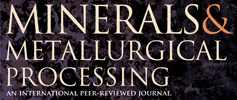Effects of sulfuric acid dosage on the baking of an enargite concentrate
Minerals & Metallurgical Processing
, 2014, Vol. 31, No. 4, pp. 193-199
Safarzadeh, M.S.; Miller, J.D.; Petersen, E.U.
ABSTRACT:
An acid bake-leach process has been identified and applied to an enargite concentrate containing ~67% enargite, ~27% pyrite (FeS2), ~3% chalcopyrite (CuFeS2), ~6% sphalerite (ZnS) and <1% galena (PbS). Sulfuric acid baking of this concentrate resulted in the transformation of the concentrate to S8, As2O3, HFe(SO4)2•4H2O, PbSO4 and Cu0.47Fe0.53SO4•H2O, all of which (except elemental sulfur and PbSO4) dissolved during the water leaching step. More than 87% Cu and 64% As were leached when the concentrate was baked at 200°C over 7 hours with a sulfuric acid-to-concentrate weight ratio of 1.6. Less than 1% As was lost to the gas phase. Upon water leaching, copper and arsenic were released to the solution at a concentration ratio of about 3:1. While enargite is very reactive during the sulfuric acid baking reaction, other minerals present in the concentrate such as pyrite, galena and sphalerite may compete to consume sulfuric acid and be converted into their corresponding sulfates at different concentrations. The purpose of this paper is to present our examination of the effects of sulfuric acid dosage on the extractions of Cu, Fe, and As from an enargite concentrate. In this regard, the concentrate, baked concentrate, and the leach residues are characterized and a conceptual process flowsheet is described for the acid bake-leach process for the treatment of enargite concentrates.





